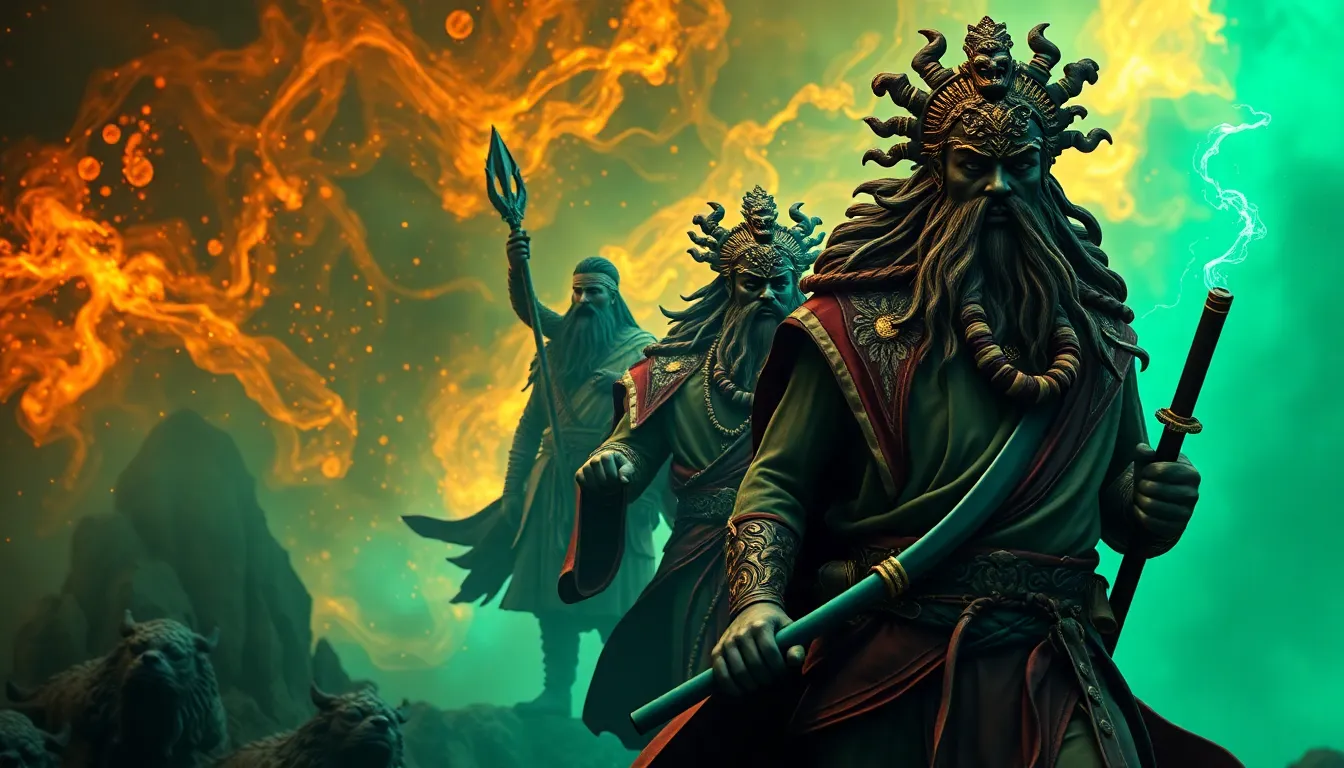Mythical Love and Betrayal: Tales of Heartbreak and Revenge
I. Introduction
Mythical love and betrayal are profound themes that have resonated through cultures and eras, encapsulating the complexities of human emotions. These narratives often explore the duality of love—the beauty and the agony—while exposing the darker facets of betrayal. The importance of these themes in mythology and literature lies in their ability to reflect our deepest fears, desires, and the consequences of our actions.
This article delves into key tales of heartbreak and revenge across various mythologies, highlighting how these narratives shape our understanding of love and the human experience.
II. The Nature of Mythical Love
A. Characteristics of Love in Mythology
Love in mythology is often depicted as a powerful, transformative force that transcends the mundane. However, the ideals presented in these stories can clash with the realities of relationships.
- Idealization vs. Reality: Many mythical love stories portray idealized relationships that are unattainable in real life, leading to tragic outcomes.
- Love as a Transformative Force: Love can lead to personal growth and transformation, but it can also bring about destruction and despair.
B. Examples of Mythical Love Stories
- Orpheus and Eurydice: A tale of love and loss, where Orpheus’s journey to the underworld to retrieve his beloved Eurydice ultimately ends in heartbreak due to his inability to follow the rules of the gods.
- Pygmalion and Galatea: This story speaks to the theme of idealized love, where Pygmalion falls in love with a statue he created, which is later brought to life, illustrating the power of love to transcend lifelessness.
III. The Seeds of Betrayal
A. Psychological and Societal Factors Leading to Betrayal
Betrayal often stems from a combination of psychological motivations and societal pressures. Jealousy, ambition, and desire can lead individuals to betray those they love.
B. Common Themes of Betrayal in Mythology
- Jealousy: Many myths illustrate how jealousy fuels betrayal, leading to devastating consequences.
- Temptation: Characters often face temptations that lead them to abandon their loved ones, revealing the fragility of loyalty.
C. Case Studies of Betrayal in Myth
- Helen of Troy and Paris: Helen’s elopement with Paris ignites the Trojan War, showcasing how personal desires can lead to widespread conflict.
- Loki and the Aesir: Loki’s betrayal of the gods highlights themes of deceit and the consequences of treachery among allies.
IV. Heartbreak in Mythical Narratives
A. The Emotional Toll of Heartbreak
Heartbreak in mythology often serves as a catalyst for character development, illustrating the emotional depths of loss and longing.
B. Mythical Figures Who Experience Profound Loss
- Dido and Aeneas: Dido’s unrequited love for Aeneas leads her to despair, ultimately resulting in her tragic demise.
- Ariadne and Theseus: Ariadne’s abandonment by Theseus after helping him escape the labyrinth showcases the pain of betrayal and loss.
C. Symbolism of Heartbreak in Mythology
Heartbreak often symbolizes the fragility of love and the inevitable suffering that accompanies deep emotional connections. It serves as a reminder of the transient nature of happiness.
V. Revenge as a Recurring Motif
A. Psychological Motivations for Revenge
The desire for revenge is a powerful emotion that often stems from feelings of betrayal, loss, and injustice. It reflects a need to restore balance and seek retribution.
B. The Cycle of Revenge in Mythology
Many myths depict a cycle of revenge, where one act of betrayal leads to another, creating a never-ending loop of vengeance that can devastate entire families or communities.
C. Notable Tales of Revenge
- Medea’s Vengeance: In a tale of betrayal, Medea seeks revenge on her unfaithful husband Jason, leading to tragic consequences for both her and her children.
- The Story of Achilles and Hector: Achilles’ quest for revenge against Hector for the death of his friend Patroclus ultimately leads to Hector’s downfall and a cycle of violence in the Trojan War.
VI. The Consequences of Betrayal and Revenge
A. Personal and Societal Repercussions
Betrayal and revenge have profound impacts, often resulting in personal tragedy and societal chaos. The ripple effects of these actions can be felt for generations.
B. The Downfall of Characters in Myth Due to Betrayal
Many characters meet their demise as a result of their own betrayals or the betrayals of others, highlighting the moral lessons embedded in these narratives.
C. Lessons Learned from These Narratives
Mythical tales often serve as cautionary stories, teaching us about the dangers of unchecked emotions and the importance of loyalty and integrity.
VII. Comparative Analysis of Love and Betrayal Across Cultures
A. Similarities and Differences in Mythical Tales from Various Cultures
While the themes of love and betrayal are universal, they manifest differently across cultures, influenced by societal norms and values.
B. Case Studies of Love and Betrayal in Different Mythologies
- Greek vs. Norse Mythology: Greek myths often emphasize the tragic nature of love and the consequences of betrayal, while Norse myths frequently explore themes of honor and revenge.
- Eastern vs. Western Mythological Narratives: Eastern myths may focus on the philosophical implications of love and betrayal, while Western tales often highlight the emotional and dramatic aspects.
VIII. The Role of Fate and Destiny
A. How Fate Intertwines with Love and Betrayal
Fate often plays a crucial role in mythical narratives, intertwining with love and betrayal to create a sense of inevitability in the characters’ journeys.
B. The Concept of Tragic Destiny in Mythology
Many characters are doomed to repeat the mistakes of their ancestors, reflecting the idea of tragic destiny and the inescapable nature of fate.
C. Examples of Characters Who Succumb to Their Fates
Characters such as Oedipus and the heroes of the Trojan War exemplify how fate can dictate the course of their lives, often leading to tragic outcomes.
IX. Modern Interpretations of Mythical Love and Betrayal
In contemporary literature and media, the themes of mythical love and betrayal continue to resonate, often reinterpreted through modern lenses. These tales are adapted in films, novels, and art, reflecting ongoing human struggles with love, loss, and the quest for revenge.
As society evolves, the core emotions of these myths remain relevant, reminding us of our shared humanity and the timelessness of our stories.



